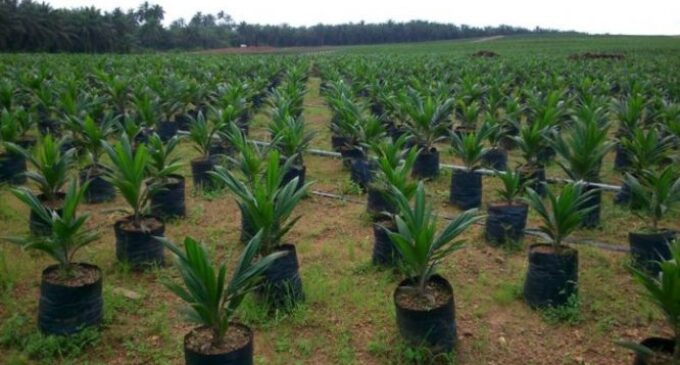INSIGHT: How Nigeria can fight climate change through nature-based solutions

Climate change affects the way humans, animals and ecosystems live, interact and survive in their environment. This shows why discussions around climate change have gained momentum over the last two decades and even more in recent times.
As the world gets ready for COP26 — the UN climate change conference in Glasgow — governments around the world are gearing up to present steps they have taken and are willing to take to tackle the global menace.
In line with this, the Nigerian senate on October 13 passed the climate change bill. The bill currently awaits the assent of President Muhammadu Buhari for it to become law.
WHAT IS IN THE BILL?
Once the bill receives the president’s assent, it will mean that the Nigerian government and key players in the sector will have legal backing for the implementation of climate change policies and programmes. It would cause organisations and individuals to become more responsible and accountable for their actions and activities that affect the climate. Also, it will provide a framework for achieving low greenhouse gas emissions (GHG).
In a copy of the bill seen by TheCable, the country intends to impose fines on private and public entities who flout their climate change mitigation and adaptation obligations. It would also adopt carbon taxation and emissions trading, which would limit the emissions of polluting industries and require them to pay a fee for every ton of carbon dioxide they emit.
The bill also provides for the country to address climate change “using nature-based solutions such as REDD+ (Reducing Emissions from Deforestation and Forest Degradation; the role of conservation and sustainable management of forests; and the enhancement of forest carbon stocks) and environmental economic accounting”.
As provided in the bill, nature-based solutions would help the country address climate change. But what are these solutions and how do they work?
WHAT ARE NATURE-BASED SOLUTIONS AND HOW WILL THEY HELP?
Nature-based solutions, or natural climate solutions, are practices adopted to enable the ecosystem to naturally remove carbon dioxide from the atmosphere. This can be achieved by restoring, conserving, and better managing the ecosystem.
Such practices include forestry practices, regenerative agriculture, restoration of coastal wetlands and marine ecosystems.
1) For forestry practices, there is reforestation and afforestation where forests are either planted, replanted, or allowed to regrow naturally. They also have to do with improving forest management, protecting forests, and limiting deforestation. Forests help in addressing climate change by serving as carbon removal or sinks. They naturally absorb carbon from the atmosphere and isolate it inside trees (sequestration). This means that carbon sequestered in these trees does not get emitted into the atmosphere, thereby limiting the impact such carbon would have had in worsening global warming and climate change.
2) There is also regenerative agriculture whereby lands are managed in a way that soils absorb and hold more carbon. It involves practices that build soil carbon, such as cover crop rotation, farming without tilling the ground (no-till farming), agroforestry (mixing tree planting and agricultural land use), and improved livestock management. Regenerative agriculture contributes to the reversal of global warming by increasing the capacity of the soil to capture carbon.
3) Restoration of coastal wetlands like mangroves is a natural climate solution that allows carbon to be stored in sediments and plants. Restoring and conserving such places as peatlands and coastal wetlands serves mainly to prevent greenhouse gas emissions.
4) The ocean also has a role to play in offering ocean-based solutions. The practice of restoring and expanding marine ecosystems can help to tackle climate change. This can be achieved through practices that seek to restore seagrass meadows which can trap carbon around their roots, leaves, stems, and underwater sediments. Also, shellfish farming can also be adopted because research shows that the shell of shellfish absorbs carbon as it grows.
Although the above are not exhaustive of nature-based solutions, these ecosystems capture carbon dioxide from the air and sequester it in plants, soils, and sediments. By doing so, they help to reduce climate change. And not just that, they also help to provide cleaner air and water, increase biodiversity and bring about economic benefits.
However, it’s important to note that nature-based solutions are not absolute solutions to tackling climate change. Intentional commitments need to be made towards emissions reduction.
HOW IS NIGERIA ADOPTING THESE SOLUTIONS?
Asides from having a provision for nature-based solutions in the recently passed climate change bill, Nigeria had earlier made provision for it in its revised nationally determined contribution (NDCs) submitted to the United Nations Framework Convention on Climate Change (UNFCCC) ahead of the UN climate change summit in Glasgow.
In the NDCs, the country listed its top three nature-based solutions to include: agroforestry, improved forest management, and forest restoration. These, Nigeria said, collectively have a mitigation potential of 89 metric tons of carbon dioxide equivalent per year.
The country committed to restoring mangroves through its ‘mangroves for life’ project. TheCable had reported in May 2021 that the federal government had started the restoration of mangroves in Ogoni land after decades of pollution by oil spills and environmental degradation in the region. As seen in the NDCs, this move to restore mangroves would also help address natural disaster risks such as coastal flooding.
In the aspect of forestry practices, the NDCs stated that the federal government had approved the creation of an additional 10 national parks, bringing the number of federal protected areas to 17. The federal government is also currently carrying out a 25 million trees planting project across the country.
However, these are not without limitations. Although the NDCs state that the restoration of the mangroves would act as a buffer for coastal communities, recent criticisms decry the slow pace of work in the Ogoni cleanup process. This is despite the president’s 2015 order that the Ogoni cleanup should be fast-tracked.
In places like Cross River, the UN reported that rural communities harvest mangrove wood for household domestic use, particularly for cooking and smoking fish. This has therefore has put serious pressure on mangrove forests and led to steady deforestation. There is also the challenge of the Nypa palm which has encroached and degraded the country’s mangroves in the region.
Commenting on the country’s reforestation programme in June, Mahmood Abubakar, the then minister of environment, said the programme had increased the nation’s forests from three to seven percent.
But the sustainability of the efforts remains in doubt. Rasak Kolawole, director, department of forestry at the ministry, told TheCable that the tree planting drive may not be sustainable because it has not been “commensurate to deforestation” ongoing in the country.
Hopefully, the climate change bill which seeks to adopt nature-based solutions and strengthen REDD+ projects will ensure the concretisation and effective implementation of government policies and programmes geared toward naturally addressing climate change.














There are no comments at the moment, do you want to add one?
Write a comment